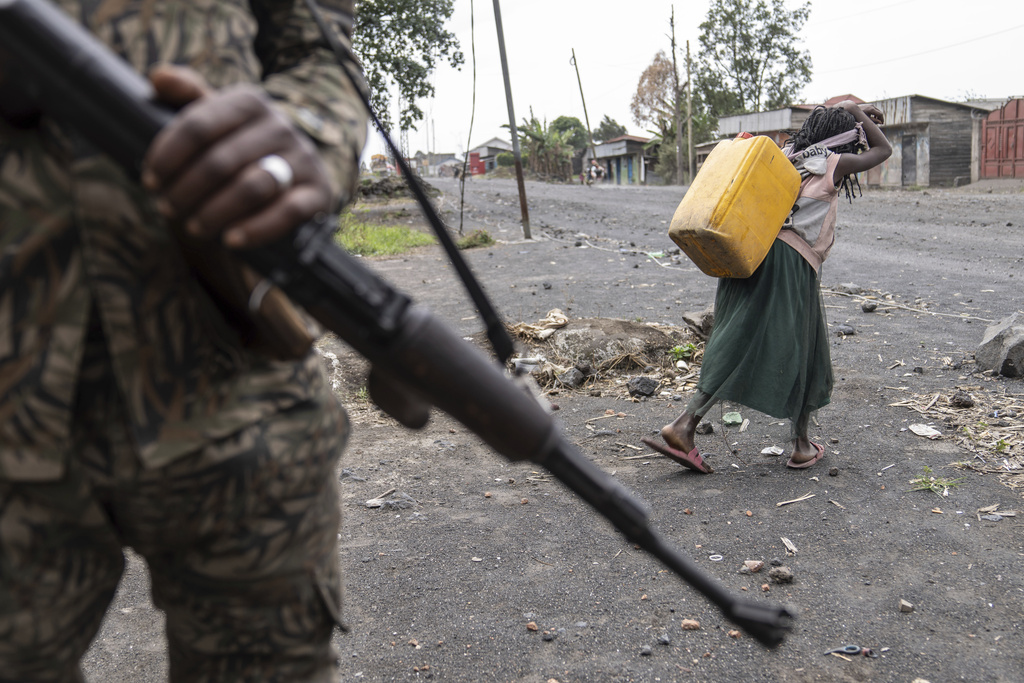M23 Rebels ‘Version 2’ Seeks to Build Stronghold in DRC
ADF STAFF
Heavily armed M23 rebels sat in trucks and on motorcycles at a checkpoint along the Sake-Kilolirwe-Kitshanga road in the eastern region of the Democratic Republic of the Congo. They stopped every traveler, took stock of their inventory, demanded a tax payment and issued a hand-written receipt.
In a recent report, a cohort of researchers estimated that M23’s extortion of civilians along this single trade route could amount to $69,500 per month.
“Control of roads is a significant strategic issue for obvious military reasons, but also for financing armed groups,” the authors wrote. “The M23 made significant progress in 2022 along major roads and sought to occupy key crossroads, bridges and commercial hubs in North Kivu. In 2023, the group occupied such crucial commercial centers as Kilolirwe, Kitshanga and Mushaki.”
Economic control has been one of the hallmarks of the M23 rebel group as it has seized large swaths of land in the eastern provinces of the DRC. In conducting investigations and surveying locals, the researchers sought to label what they say has been an evolution of the insurgent group, calling it “Version 2” of the M23.
A report published in April by the International Peace Information Service (IPIS) and the Danish Institute for International Studies (DIIS) was based on 57 interviews conducted by the Goma-based civil society organization Association pour le Développement des Initiatives Paysannes.
“The current M23 crisis … is seen as an extension of a war based on the objectives of occupying land and undermining power, particularly customary power,” the report stated. “In addition to external support from the Rwandan army, the M23 uses several revenue-generating activities within North Kivu.”
The researchers concluded that the M23 rebel group is seeking long-term local political power in eastern DRC using historical land disputes, political marginalization and illicit taxation schemes to expand and solidify their authority. Those interviewed included members of M23, as well as Congolese Soldiers, members of armed groups fighting the M23, local chiefs, teachers, traders and farmers who live on the conflict’s frontlines.
The United Nations on October 30 reported that 6.9 million people have fled the conflict in eastern DRC, making it one of the world’s largest displacement and humanitarian crises.
After lying dormant for 10 years, a unified and resurgent M23 rebel group launched sustained attacks in 2022 in the province of North Kivu and has since fought against Congolese troops, local militias and multinational forces. M23 officials have said their attacks were designed to seize control of and protect land acquired by the ethnic Tutsi community.
“M23, however, has been accused of not just human rights abuses by groups like Human Rights Watch but has also on at least one occasion attacked U.N. peacekeepers who had been tasked with protecting civilians,” security analysis website Geopolitical Monitor wrote in an October 30 situation report.
In addition to detailing M23’s elaborate tax scheme in their report, IPIS researcher Ken Matthysen and DIIS senior researcher Peer Schouten examined the insurgent group’s practices of forced labor and illegal exploitation of natural resources, such as timber and charcoal trafficking.
“M23’s disruptive strategy aims to replace Congolese authorities and overhaul local governance in areas it controls in eastern DR Congo,” they wrote in an October 26 article for The Conversation Africa magazine. “Many Congolese we spoke to perceive M23’s main aim to be control of power at the local level — undermining the existing authorities.
“The group has indeed sought to replace customary authorities with M23-appointed ones, at times assassinating Congolese chiefs. Local sources said M23 even burnt chiefdom archives, destroying evidence of claims to customary authority.”
The researchers warn that instability in eastern DRC has deepened since M23’s revival in 2022, as more tribal and ethnic groups have gotten involved.
In fighting against M23, the Congolese military has aligned with and given new life to a host of local armed groups under the banner of “Wazalendo, which is Swahili for “patriots.” But these fragmented groups also interfere in local governance and extort citizens.
“Instead of curbing the rise of these armed groups, the DRC government has rather legitimized the Wazalendo phenomenon,” the report stated. “These trends have led to a militarization of the local governance context, which risks jeopardizing future disarmament efforts and pacification in eastern DRC, beyond the current crisis.”

